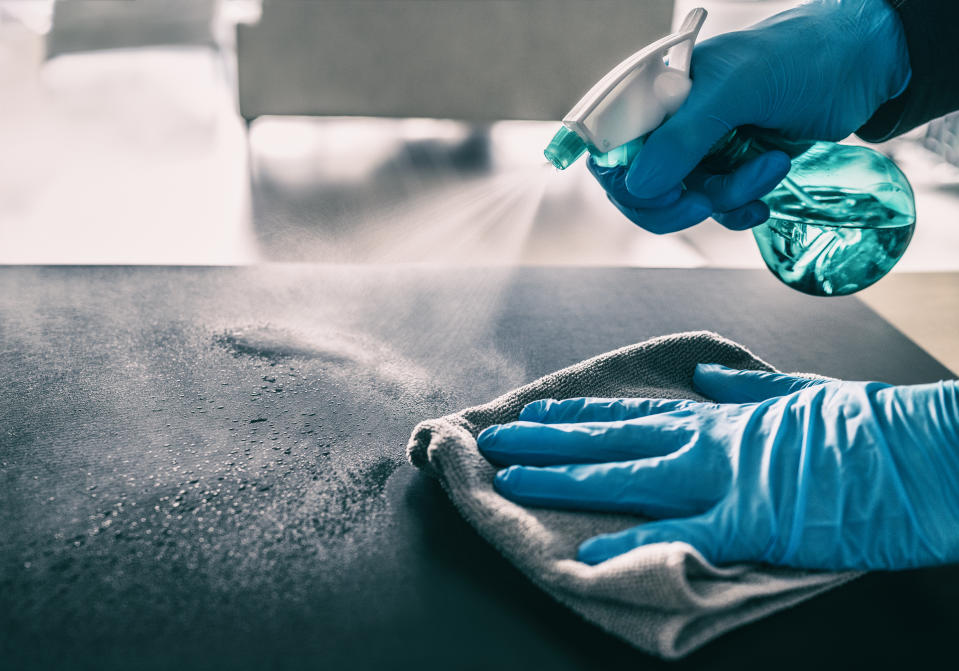Disinfectants and COVID-19: There's a right way and a wrong way to clean
The Environmental Protection Agency is regularly adding new products to its list of disinfectants that can kill SARS-CoV-2, the virus that causes COVID-19. But one very recognizable disinfectant just made the list: Pine-Sol.
Now that it is included on the EPA’s List N: Disinfectants for Use Against SARS-CoV-2, the makers of Pine-Sol can advertise that their product can kill the virus — and they already have. Pine-Sol’s website currently recommends that you do the following to kill SARS-CoV-2 on surfaces:

Apply full-strength Pine-Sol to a surface with a clean sponge or cloth.
Wet the surface
Let everything stand for 10 minutes.
Rinse it off.
Ten minutes seems like a long time — and it is. But, when you read the labels of other popular disinfectants on the EPA’s List N, you’ll find that many others also recommend letting the product sit in order for it to kill SARS-CoV-2. Here’s the time frame recommended for other popular products:
Newsletter: The Yodel
Trusted news and daily delights, right in your inbox
See for yourself — The Yodel is the go-to source for daily news, entertainment and feel-good stories.
Clorox bleach: 10 minutes
Lysol Disinfectant Spray: 3 minutes
Lysol All Purpose Cleaner: 2 minutes
Zep Spirit II: 1 minute
Spray Nine multipurpose disinfectant spray: 30 seconds
Even Clorox’s Clean-Up Cleaner With Bleach recommends that you let it sit for 30 seconds before wiping.
Why are these time frames so different? “It’s very much about the dilution of the product, what else is in the product and how the laboratory studies were done,” Dr. William Schaffner, an infectious disease specialist and professor at the Vanderbilt University School of Medicine, tells Yahoo Life. It also “depends on the mode of action of killing,” Jamie Alan, an assistant professor of pharmacology and toxicology at Michigan State University, tells Yahoo Life.
Given that most people spray disinfectants and immediately wipe them up, this raises questions about whether you’re actually doing anything when you clean.
Technically, you’ve probably been using your go-to disinfectant incorrectly, Dr. Amesh A. Adalja, senior scholar at the Johns Hopkins Center for Health Security, tells Yahoo Life. “The instructions for use are based on studies the companies did about how viable the virus was after certain periods of time,” he says. “There is a reaction when the virus comes into contact with chemicals and can take time. It doesn’t occur instantaneously.”
Before you panic, know this: Spraying or applying a disinfectant and then wiping it up immediately probably does something, Schaffner says. “If you spray a disinfectant on a surface and then you wipe it off, the virus is probably then on the cloth,” he says. “You’re performing two functions: putting on the disinfectant to kill the virus and then wiping it off the surface.”
Just know that if you apply the disinfectant and then wipe right away, you probably won’t kill everything. “You will likely reduce the viral load on the surface. By exactly how much, I can’t say,” Alan says.
Schaffner stresses the importance of washing your hands well after you clean. “If the virus is on the cloth or paper towel you used, it can get on your hands,” he says.
If you want to make sure you kill SARS-CoV-2 on surfaces, Adalja says it’s really best to follow the directions for use. “If you’re very risk-averse and want to be as careful as possible, then follow what’s on the manufacturer’s label,” he says.
But letting cleaner sit for up to 10 minutes? Apparently it’s doable. “I usually spray it on, leave it on while I do something else, spray again with cleaner to remoisten, and then wipe it off,” Alan says.

For the latest coronavirus news and updates, follow along at https://news.yahoo.com/coronavirus. According to experts, people over 60 and those who are immunocompromised continue to be the most at risk. If you have questions, please reference the CDC’s and WHO’s resource guides.
Read more from Yahoo Life
Want lifestyle and wellness news delivered to your inbox? Sign up here for Yahoo Life’s newsletter.
Solve the daily Crossword

